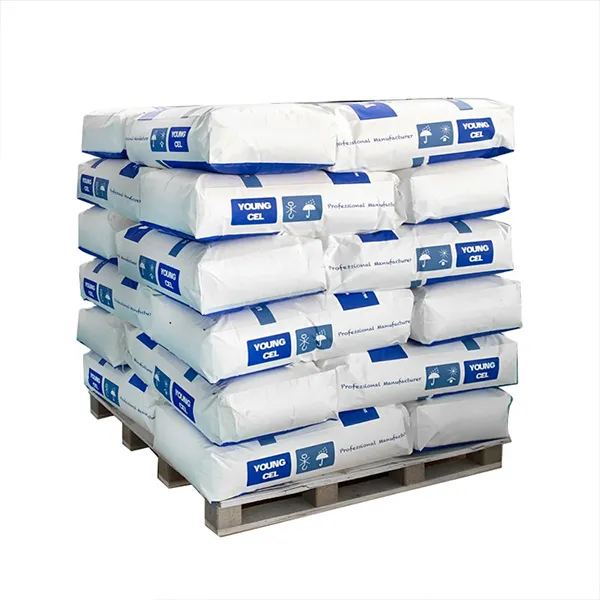Understanding Liquid Methyl Cellulose Its Applications and Benefits
Liquid methyl cellulose (LMC) is a versatile polymer derived from cellulose, a natural polymer found in plant cell walls. Because of its unique chemical properties, methyl cellulose is widely used in various industries, including food production, pharmaceuticals, cosmetics, and construction. This article will delve into the properties, applications, and benefits of liquid methyl cellulose.
What is Liquid Methyl Cellulose?
Liquid methyl cellulose is produced through a chemical modification of cellulose, where hydroxyl groups in cellulose molecules are replaced by methoxy groups. This modification results in a water-soluble compound that can be easily manipulated for various applications. LMC appears as a clear, viscous liquid that can be easily mixed with water, making it suitable for diverse formulations.
Properties of Liquid Methyl Cellulose
Liquid methyl cellulose exhibits several important physical and chemical properties, including
1. Viscosity LMC solutions display a wide range of viscosities depending on concentration and temperature. This property is crucial for applications that require specific fluid dynamics, such as coatings and adhesives.
2. Thickening Agent LMC acts as an effective thickening agent, increasing the viscosity of liquid formulations without changing other properties significantly.
3. Stabilization It helps stabilize emulsions and suspensions, preventing the separation of components in food products and cosmetic formulations.
4. Film-Forming Ability LMC can form a strong, flexible film when dried, making it useful in coatings and protective barriers.
5. Biocompatibility Non-toxic and biodegradable, LMC is suitable for use in food and pharmaceutical applications.
Applications of Liquid Methyl Cellulose
1. Food Industry In the food industry, liquid methyl cellulose serves as a thickening, gelling, and stabilizing agent. It is utilized in products such as sauces, dressings, ice creams, and bakery items to improve texture and mouthfeel. LMC can also serve as a fat replacer, providing creaminess without additional calories, making it ideal for low-fat and reduced-calorie products.
liquid methyl cellulos

2. Pharmaceuticals In pharmaceuticals, LMC is used as a binder in tablet formulations and as a suspending agent in liquid medications. It enhances the stability of active ingredients and helps in controlled release formulations. Its biocompatibility also makes it suitable for drug delivery systems.
3. Cosmetics and Personal Care LMC is often added to lotions, creams, and gels for its rheological properties, improving the texture and feel. Its thickening ability enhances the spreadability of cosmetic products, while its film-forming property provides a smooth and pleasant finish.
4. Construction Industry In construction, LMC is used as an additive in cement and mortar formulations. It improves workability, enhances adhesion, and helps retain moisture in building materials, which is essential for curing and strengthening processes.
5. Biomedical Applications Liquid methyl cellulose has gained attention in biomedical applications, particularly in wound dressings and tissue engineering. Its biocompatibility and ability to maintain moisture make it beneficial for rapid wound healing.
Benefits of Liquid Methyl Cellulose
The use of liquid methyl cellulose offers numerous benefits across various industries
- Versatility Due to its wide range of applications, LMC can be adapted for various formulations and processes, making it a valuable ingredient in many products.
- Enhancement of Product Quality Its ability to improve texture, stability, and mouthfeel enhances the overall quality of food and cosmetic products.
- Healthier Alternatives In food applications, LMC provides healthier options, such as fat reduction, without compromising flavor or texture.
- Sustainability Being derived from a natural polymer, LMC aligns with the increasing emphasis on sustainability and eco-friendly ingredients.
Conclusion
Liquid methyl cellulose is a remarkable substance that plays a crucial role in many industries. Its unique properties, such as viscosity, thickening capabilities, and film-forming ability, make it a valuable ingredient for enhancing product quality and functionality. As industries continue to innovate, the demand for versatile and sustainable materials like liquid methyl cellulose is likely to grow, paving the way for new applications that improve our daily lives. Understanding the implications and potential of LMC can help in harnessing its full benefits across various fields.
-
A Comprehensive Guide to Methyl Ethyl Hydroxyethyl Cellulose: Applications and Industry InsightsNewsNov.24,2025
-
Understanding Methyl 2 Hydroxyethyl Cellulose: Uses, Benefits & Industry InsightsNewsNov.24,2025
-
Hydroxyethyl Methyl Cellulose HEMC: Industrial Uses, Benefits & Future TrendsNewsNov.23,2025
-
HEMC Cellulose: Versatile & Sustainable Industrial Polymer | YoungcelNewsNov.23,2025
-
Methyl Hydroxyethyl Cellulose: Versatile Building Block for Industry & SustainabilityNewsNov.23,2025
-
CAS 9032 42 2: Understanding Polyvinyl Alcohol's Impact on Industry & SustainabilityNewsNov.22,2025




